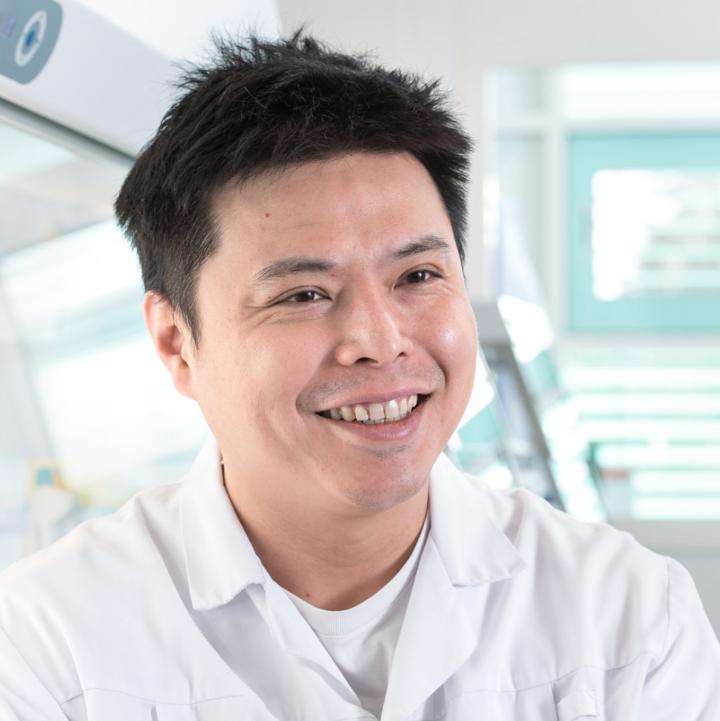Ludwig researchers discover possible way to make resistant melanomas susceptible to immunotherapy

Credit: Ludwig Cancer Research
NEW YORK, Jan. 22, 2019–A Ludwig Cancer Research study has uncovered a cellular mechanism by which melanomas that fail to respond to checkpoint blockade may be made susceptible to such immunotherapies. Led by Ping-Chih Ho of the Lausanne Branch of the Ludwig Institute for Cancer Research and reported in the current issue of Nature Immunology, the study also identifies an existing diabetes drug that could be used to accomplish that feat.
Checkpoint blockade therapies lift the brakes imposed by the body on the immune response, prompting an attack on tumors by the immune system’s killer T cells. Although these therapies have notched up successes against some major cancers–most notably melanoma and lung cancer–they fail to induce responses in many patients. For example, more than 40% of melanoma patients fail to benefit from even a combination of anti-PD1 and anti-CTLA4 checkpoint blockade therapies.
“We know that when patients don’t respond, the main reason is that their tumors are not infiltrated with T cells,” says Ho. “It’s like the immune system doesn’t have soldiers on the battle field, so it can’t engage in the battle.”
Wan-Chen Cheng, a graduate student in Ho’s lab and the first author of the study, began by examining what differentiates gene expression in such “cold” tumors from that of their “hot”, T cell-infiltrated counterparts. A computational analysis of the genes expressed by melanomas profiled in The Cancer Genome Atlas (TCGA)–a public repository of genomic and clinical information on a wide variety of tumors–revealed that tumors that elicit robust anti-cancer immune responses also tend to express high levels of a metabolic protein named UCP2.
Gene expression patterns suggested UCP2-expressing melanoma tumors also express a subset of “cytokines” that draw immune cells into their microenvironment, particularly the killer T cell and the conventional type 1 dendritic cell (cDC1). The latter can prime and boost the killer T cell attack on sick cells. Further analysis of TCGA data suggested that tumors expressing UCP2 appear to be infiltrated with killer T cells and cDC1 cells.
To test these inferences, Cheng, Ho and their team grafted into mice melanoma tumors that could be prompted to express high levels of UCP2. Inducing UCP2 expression indeed boosted the production of factors that drive anti-cancer responses and drew a flood of killer T cells and cDC1 cells into the tumors. Tumors in mice engineered to lack cDC1 cells lacked such T cell infiltration, even when UCP2 was overexpressed.
“With these studies we confirmed that the expression of this protein by cancer cells can change the immune status of the tumor microenvironment, and that this precipitates a well-known anti-tumor immune cycle that is controlled by cDC1 and killer T cells,” says Ho.
The researchers next engrafted mice with melanoma tumors known to resist anti-PD-1 checkpoint blockade. Inducing UCP2 expression in these tumors and treating the mice with an anti-PD1 drug elicited robust anti-tumor immune responses that significantly extended survival of the mice. The enhanced immunity also seemed to be restricted to the tumor microenvironment, attenuating a risk associated with checkpoint-blockade: the provocation of autoimmune responses that destroy healthy tissues, sometimes to debilitating and even lethal effect.
Scouring the literature, the researchers also identified a diabetes drug named rosiglitazone that has been reported to induce UCP2 expression. Treating tumor-bearing mice with this drug similarly turned cold tumors hot, sensitized them to checkpoint blockade and extended survival. Notably, the team found the drug induced UCP2 expression in cultures of melanoma cells obtained from patients as well.
“Our results suggest that drugs that activate this pathway might improve the therapeutic outcomes of checkpoint blockade treatment,” says Ho. “The UCP2 protein might additionally serve as a diagnostic marker of response to checkpoint blockade treatment. That’s something we are working on right now.”
The researchers are also confirming their results in preclinical studies that could support a trial evaluating the use of rosiglitazone to improve checkpoint blockade therapy for melanoma.
###
This study was supported by Ludwig Cancer Research, the Swiss Institute for Experimental Cancer Research, the Swiss Cancer Foundation, the Swiss National Science Foundation, the Cancer Research Institute, the Harry J. Lloyd Charitable Trust, SITC-MRA, the MEDIC Foundation, the Swiss Cancer League and the Giorgi-Cavaglieri Foundation.
In addition to his Ludwig post, Ping-Chih Ho is an Assistant Professor at the University of Lausanne.
About Ludwig Cancer Research
Ludwig Cancer Research is an international collaborative network of acclaimed scientists that has pioneered cancer research and landmark discovery for more than 40 years. Ludwig combines basic science with the ability to translate its discoveries and conduct clinical trials to accelerate the development of new cancer diagnostics and therapies. Since 1971, Ludwig has invested $2.7 billion in life-changing science through the not-for-profit Ludwig Institute for Cancer Research and the six U.S.-based Ludwig Centers. To learn more, visit http://www.
For further information please contact Rachel Reinhardt, [email protected] or +1-212-450-1582.
Media Contact
Rachel Reinhardt
[email protected]
212-450-1582
Related Journal Article
http://dx.




